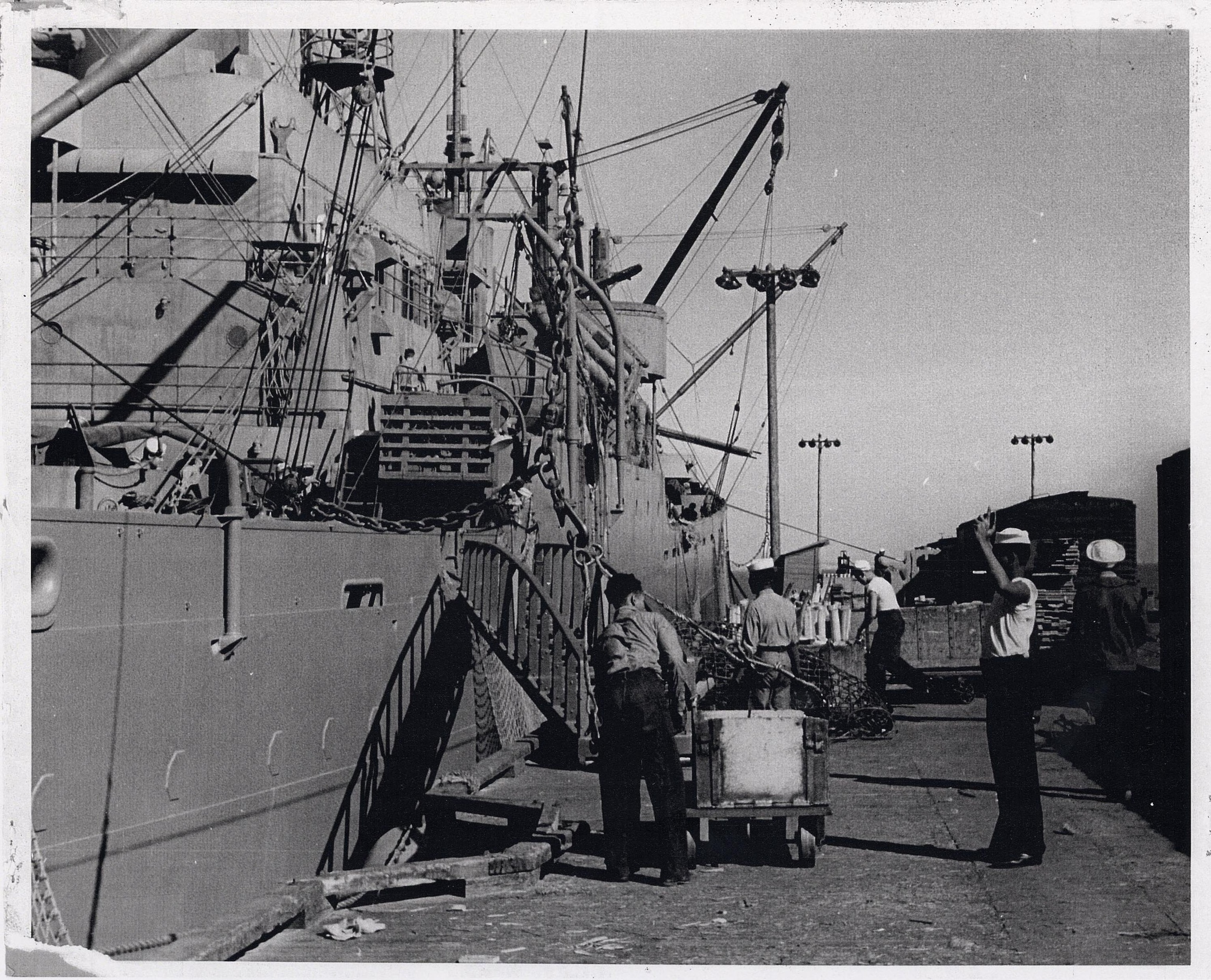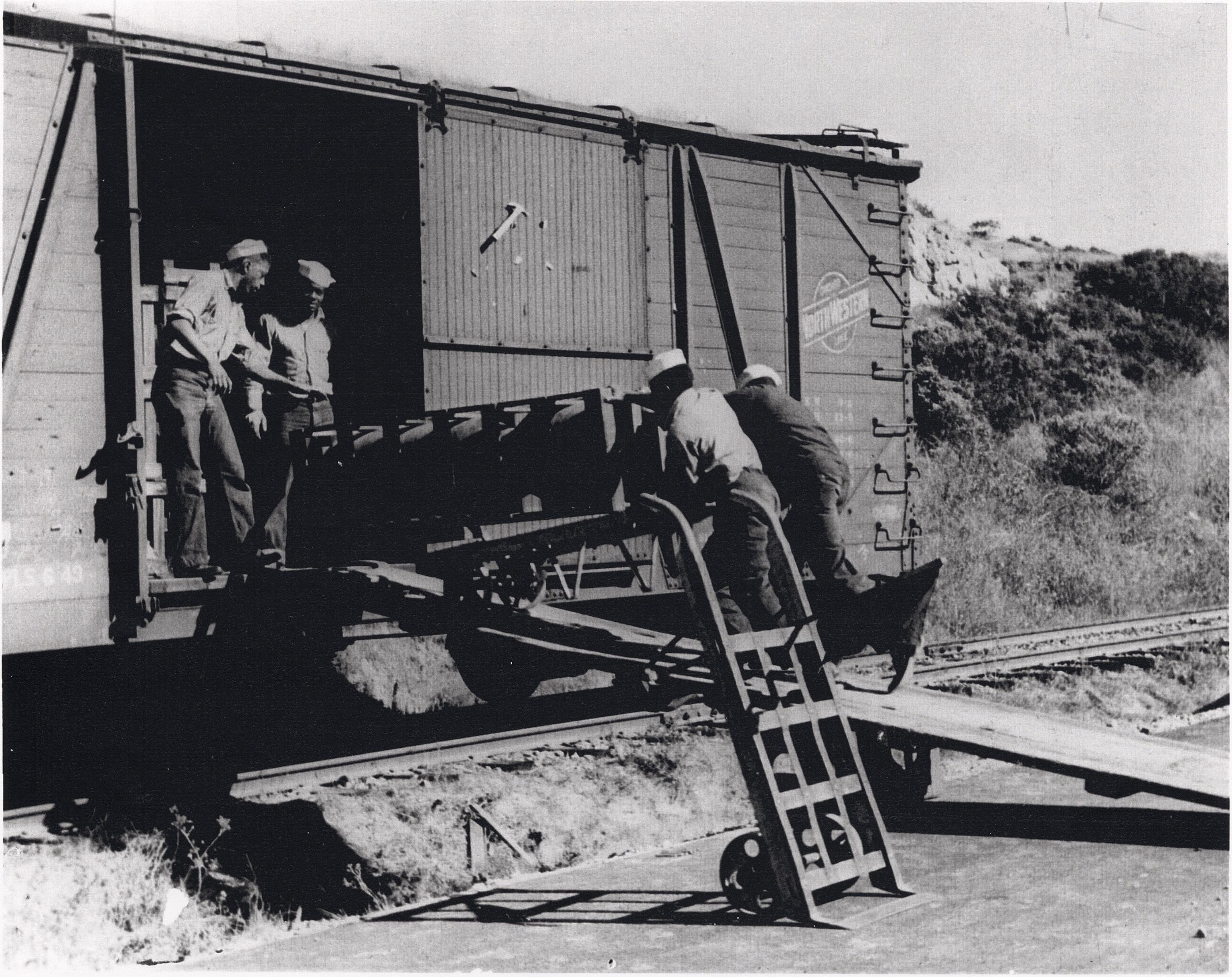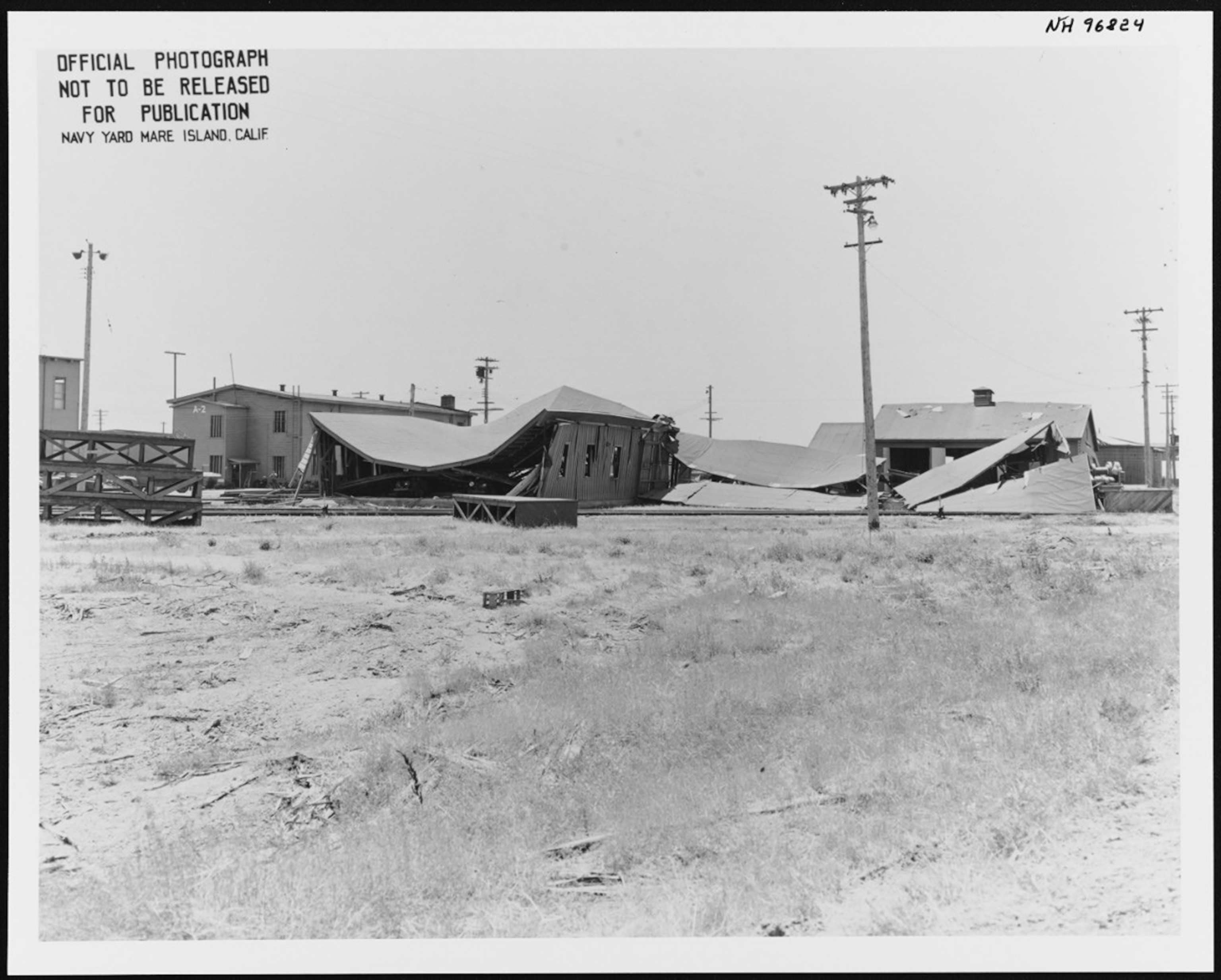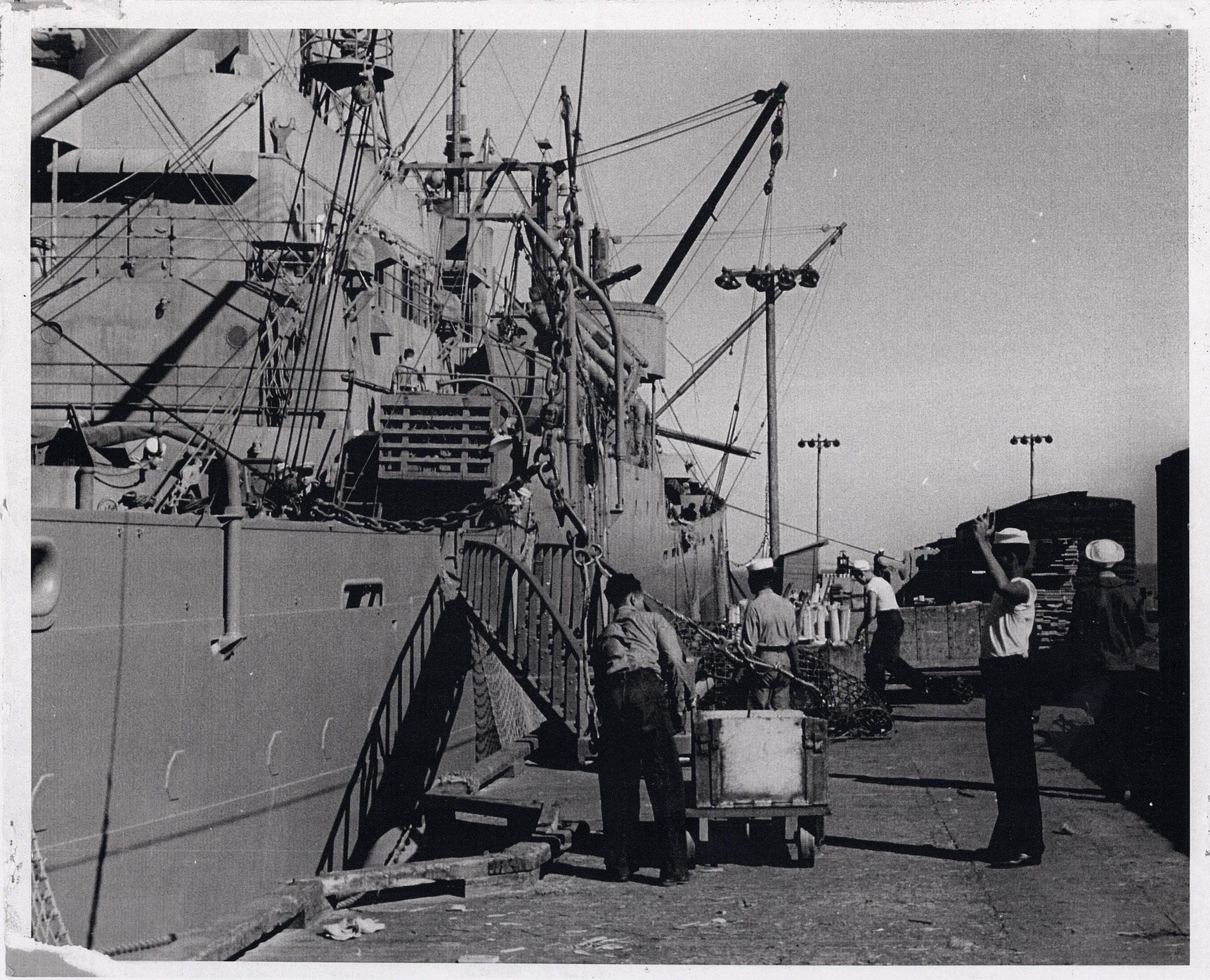The U.S. Navy has exonerated 256 Black sailors who were unjustly court-martialed in 1944 following the Port Chicago explosion in California that killed 320 people.
The sailors had been punished for refusing to go back to work in what they considered to be an unsafe environment. Their prosecution took place at a time when the U.S. military was still segregated and reflected the unfair treatment that Black sailors experienced.
The 256 sailors were exonerated by Navy Secretary Carlos Del Toro on the 80th anniversary of the accidental, deadly World War II-era blast, which also injured 400 other people. The explosion at an ammunition loading area also damaged two ships and a train, and caused damage to the nearby town of Port Chicago, located east of Oakland, California.
Del Toro’s exoneration carries more weight than a pardon, which acknowledges guilt. Instead, the exoneration will vacate all of the court-martials that the 256 sailors had to go through.

A view of loading activity at the Port Chicago Naval Magazine munitions pier is seen circa 1943/44, at Port Chicago, Calif.
U.S. Navy/National Park Service
What happened after the deadly explosion reflected the double standard experienced by white and Black personnel in the segregated military at the time.
White supervising officers at Port Chicago were given hardship leave, while the surviving Black sailors they commanded in segregated units that loaded ammunition were ordered back to work at the port, which had been functioning around the clock to get ammunition to U.S. troops on the front lines.
Expressing safety concerns about their workplace in the wake of the deadly blast, 258 Black sailors refused to return to work handling dangerous ammunition.

African American sailors of a naval ordnance battalion are seen unloading aerial bombs from a railcar, Port Chicago Naval Magazine, circa 1943/44.
U.S. Navy/National Park Service
After threats of disciplinary action, 208 of the sailors returned to work — but they still received summary court-martials for disobeying orders and received a Bad Conduct Discharge and forfeiture of three months’ pay. Later reviews suspended the discharges, lowered the amount of the forfeitures and set aside one conviction for insufficient evidence.
The other 50 sailors who refused to return to work were convicted and charged with mutiny; they have become known as the “Port Chicago 50.”
In a mass court-martial, these sailors were sentenced to a Dishonorable Discharge, 15 years confinement at hard labor, a reduction in rank, and total forfeiture of their pay. Later reviews of the general court-martial resulted in a suspension of the discharges and reduced the period of confinement from 15 years to 17-29 months.
Two sailors were later cleared.

Damage resulting from the July 17, 1944 ammunition explosion shows the collapsed Building A-14 (Garage) at Port Chicago, Calif.
Mare Island Navy Yard
By January 1946, nearly all the sailors had been released and were given the opportunity to finish their military service contracts.
“The Port Chicago 50, and the hundreds who stood with them, may not be with us today, but their story lives on, a testament to the enduring power of courage and the unwavering pursuit of justice,” Del Toro said in a Navy statement. “They stand as a beacon of hope, forever reminding us that even in the face of overwhelming odds, the fight for what’s right can and will prevail.”
Del Toro’s decision to exonerate the 256 sailors follows a legal review by the Navy’s General Counsel that found significant legal errors during the court-martial, including trying them all together despite conflicting interests, as well as a denial of what the Navy called “meaningful right to counsel.”
“The courts-martial also occurred before the Navy’s Court of Inquiry report on the Port Chicago explosion was finalized, which certainly would have informed their defense and contained nineteen substantive recommendations to improve ammunition loading practices,” the Navy’s statement read.
All of the sailors who were convicted following the blast are now deceased, and the Navy is asking any possible descendants to reach out to the branch for future notifications about the incident.
In a historic move, the U.S. Navy has officially exonerated 256 Black sailors who were unjustly court-martialed for their alleged role in the Port Chicago explosion during World War II. This long-awaited decision comes more than 75 years after the tragic incident that claimed the lives of 320 people, mostly African American sailors.
The Port Chicago explosion occurred on July 17, 1944, when two ships being loaded with ammunition for the war effort exploded at the naval base in Port Chicago, California. The blast was so powerful that it could be felt as far away as Nevada and caused extensive damage to the surrounding area. In the aftermath of the explosion, the Navy quickly sought to assign blame and hold someone accountable for the disaster.
Unfortunately, instead of conducting a thorough investigation into the causes of the explosion, the Navy chose to place the blame on the Black sailors who were working at the base. These men were tasked with loading ammunition onto the ships, a dangerous job that was often done under unsafe conditions and without proper training. Despite their lack of experience and the hazardous working conditions, these sailors were held responsible for the explosion and were subsequently court-martialed for mutiny and disobeying orders.
The court-martial proceedings were deeply flawed, with many of the sailors being denied legal representation and facing racial discrimination throughout the trial. In the end, 50 men were convicted of mutiny and sentenced to prison terms, while others received lesser punishments. The injustice of these convictions has haunted the families of the sailors for decades, with many calling for their exoneration and recognition of their sacrifice.
Now, after years of advocacy and pressure from civil rights groups and lawmakers, the Navy has finally taken steps to right this historic wrong. In a ceremony at the Pentagon, Navy officials formally exonerated the 256 Black sailors who were unjustly convicted in connection with the Port Chicago explosion. The Navy acknowledged that the court-martial proceedings were deeply flawed and that the sailors had been denied due process and fair treatment.
This exoneration is a significant step towards acknowledging the systemic racism and discrimination that Black service members faced during World War II and beyond. It is a recognition of the sacrifices made by these men in service to their country and a long-overdue apology for the injustice they suffered.
As we reflect on this chapter of our history, it is important to remember the courage and resilience of these sailors who faced discrimination and injustice with dignity and grace. Their exoneration serves as a reminder of the ongoing struggle for racial equality and justice in our society, and a call to continue fighting for a more just and equitable future for all.



